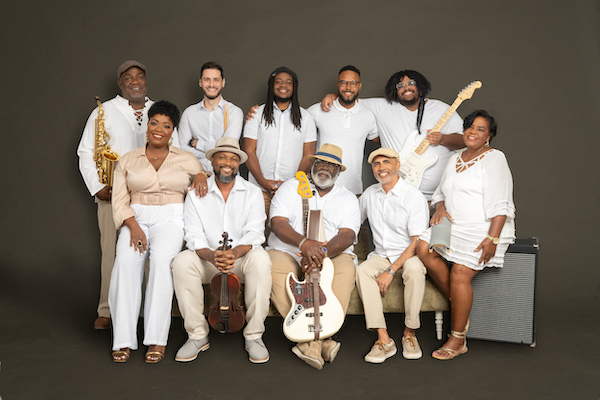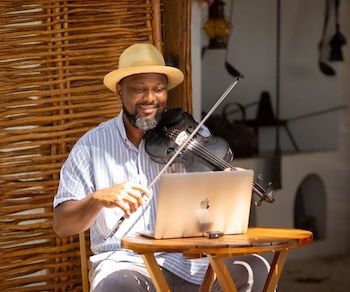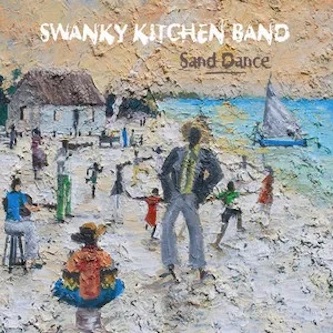Musician Interview: “They drowned out the roaring sea ” — Swanky Kitchen Band Brings the Sounds of the Cayman Islands to the Lowell Folk Festival
By Noah Schaffer
Swanky Kitchen Band is single-handedly carrying on the venerable, but little known, Afro/Celtic/Caribbean tradition of fiddle-led dance bands in the Cayman Islands.

The Swanky Kitchen Band. Photo: Blue Dot Studio
Audiences can expect a few constants at the Lowell Folk Festival: Bluegrass, Irish, blues and Cajun or zydeco music are pretty much always represented. But some of the festival’s most memorable performances have been supplied by artists who carry on traditions that few of us even knew existed.
It’s a safe bet that the upcoming appearance by the Swanky Kitchen Band will fall into that category. The group is single-handedly carrying on the venerable, but little known, Afro/Celtic/Caribbean tradition of fiddle-led dance bands in the Cayman Islands. The island’s infectiously fun mix of Scotch/Irish fiddle and guitar tunes, African percussion and Caribbean wordplay all come together in a one-of-a-kind sound.
Swanky Kitchen fiddler Samuel Rose recently spoke with the Arts Fuse via Zoom as the band was rehearsing for its East Coast tour, which will include an appearance in Providence on Friday and multiple sets in Lowell on Saturday and Sunday, along with a Sunday afternoon workshop called “Caribbean Crossroads: From the Bayou to the Barrio,” that will bring together the Swanky Kitchen Band, Creole dancehall greats Joe Hall & the Cane Cutters, New York’s Afro Dominicano, and New Orleans funk legend Cyril Neville.
Rose started the chat by mentioning that the dates are a homecoming of sorts for two Swanky Kitchen members who graduated from Berklee College of Music: multi-instrumentalist Beneil Miller and drummer Jared Tibbetts.
Arts Fuse: Maybe it’s also a homecoming in the way that this tradition echoes some of our musical traditions here in New England, extending up to maritime Canada, where the traditional dance groups also play what they call kitchen party music.

Sam Rose of the Swanky Kitchen Band. Photo: courtesy of the artist
Samuel Rose: There’s a lot of synergy between that whole Northeast corner of the United States and the Cayman Islands. Our first settlers were Scotch-Irish, and they would have been either people who were shipwrecked, or they came across from other islands, like Jamaica. Of course, the other set of people who came here were African slaves. So the Cayman Islands were a place that not many people chose to come to. A lot of people just kind of ended up here. And they brought their culture with them. There are records from the 1800s of fiddlers performing in every district on all three of the islands. The most vivid description of kitchen band music was part of the announcement of emancipation. The document talks about the fiddles, the banjos, the drums and, of course, the grater, which they use in the kitchen. And it claims that the sound “drowned out the sounds of the roaring sea.” Our band’s most important member is Miss Paula [Scott] who plays the grater. We also built a lot of schooners here in the Cayman Islands, so that’s another connection with New England.
AF: The Caymanian fiddle tradition has all but disappeared. How did you end up preserving it?
Rose: I’m guessing you’re old enough to remember video cassettes! So back in the VCR days, we didn’t have much satellite TV, we had tapes. My mom’s a musician who taught and plays piano in our church. They had rented a tape of an orchestra, and I can remember being four years old and sitting there on the living room floor looking at this orchestra and seeing these people playing this thing, and I said ‘I want that please.’ It was a violin, and I got one for Christmas and began lessons right after that. I started formal lessons in the Suzuki method and continued through high school. In 2003, when I came home from university, someone made a suggestion of trying to keep the traditional music alive, because there was only one band left doing it at the time, and those guys were senior citizens. Someone said “Hey, if you don’t do this when those guys are gone this tradition of hundreds of years will be gone forever.” And so that burden kind of fell on my shoulders – or maybe I should call it a baton and a torch, not a burden!
AF: When you’re home where does the band play? And is this dance music?
Rose: We’re like a Swiss army knife. We started as a trio – our rhythm guitarist Nicholas [Johnson] is one of the other founders. Sometimes if someone is having a 90th birthday party three or four of us will go and jam. For bigger corporate events or major national events being put on by the government we’ll have full amplification and up to ten of us. There are a couple of dances that go along with the music. Sadly, most of the dances have been lost. They would have been quadrilles, patterned dances with different figures, round dances where partners would be passed around, and there would have been waltzes. You have quadrilles today throughout the Caribbean, and sometimes teachers come here from other Caribbean islands. They teach us quadrilles that aren’t necessarily from a Caymanian tradition. The older folks, when they hear some of the other Caribbean versions of quadrille, say “that’s not ours.”
 AF: So when you started the band, with the music almost gone from the island, how did you learn your repertoire?
AF: So when you started the band, with the music almost gone from the island, how did you learn your repertoire?
Rose: Thank god someone had the foresight to record a couple of the masters, like the great Radley Gourzong, a fiddler who in 1987 performed at the Grand Ole Opry when it was still at the Ryman. We have a big love for country music here in Cayman, so quite a bunch of the country music stars actually co-owned a hotel in Cayman back in the ’80s, and the talk show Nashville Now filmed a few episodes here. We’ll sometimes do “Folsom Prison Blues” in our shows. Our original producer, Charles Gregory, also made a record with Big Al Downing [the Black country/rockabilly pioneer who lived in Central Massachusetts for much of his life. Gregory was also, along with Swanky Kitchen Band bassist Lammie Seymour, a member of Memory of Justice, a popular Caymanian soul-reggae act that recorded with Jamaican legends Sly and Robbie in the early 80s.]. And there was another national icon, ‘Aunt Julia’ Hydes, who we got to perform with because she lived to be 106. And then there are times where people would come up and ask if we knew a song. So it’s been a journey of learning.
AF: Speaking of journeys, you recently made one to the US that led to this tour. Can you explain how you ended up at the famous Old Fiddler’s Convention in Galax, VA?
Rose: I’d heard about and seen videos of the Old Fiddler’s Convention. During COVID we couldn’t travel, so when the restrictions ended I decided to check it out. I flew up there knowing nothing. I didn’t bring my fiddle, because I’m not a bluegrass or old-time musician, I wasn’t going to enter the competitions. So I showed up and walked around and I just started meeting people and they were very welcoming, I didn’t feel at any point like I was out of place, even though there weren’t many people of color there. And everyone said to me you need to come again next year and bring your fiddle. I said instead of just bringing my fiddle I’m going to bring my band! So in 2023 six of us came. And at the first tent we were hanging out with Danny Knicely, a renowned multi-instrumentalist. There was this guy in a baseball cap asking all these deep-layered questions about culture and society in the Cayman Islands. That turned out to be Dr. Jon Lohman, the former state folklorist of Virginia and the founder of the Center for Cultural Vibrancy [which is co-presenting the Swanky Kitchen Band’s US tour, which also includes dates at Lincoln Center and at the Blue Ridge Music Center in Galax]. He and Danny have been to the Cayman Islands several times now and things have just been blossoming from there.
AF: Why do you think there’s been so much interest and excitement about Caymanian kitchen music being preserved? And in hearing it live in the US?
Rose: America has such an incredible fiddle culture. And I think when people see that there are fiddle cultures in other places — especially where they never dreamed that one existed — it piques their interest. We have a sound that’s in some ways close to what you have here, but it is also different. It’s a humbling honor that people from this rich tradition find our little thing so special. It’s like finding family that you didn’t know you had.
Noah Schaffer is a Boston-based journalist and the co-author of gospel singer Spencer Taylor Jr.’s autobiography A General Becomes a Legend. He also is a correspondent for the Boston Globe, and spent two decades as a reporter and editor at Massachusetts Lawyers Weekly and Worcester Magazine. He has produced a trio of documentaries for public radio’s Afropop Worldwide, and was the researcher and liner notes writer for Take Us Home – Boston Roots Reggae from 1979 to 1988. He is a two-time Boston Music Award nominee in the music journalism category. In 2022 he co-produced and wrote the liner notes for The Skippy White Story: Boston Soul 1961-1967, which was named one of the top boxed sets of the year by the New York Times.

Swanky…. definutely the BEST in its Class … is keeping the authentic Caymanian musical heritage and Culture alive… and well !!!
And so has the Comedy Team of “Sookie ‘n Zeekiel” , who, since 1976, have made us laugh, while preserving Cayman Culture !!!
LET US PROUDLY EMBRACE AND PRESERVE OUR CAYMANIAN CULTURE AND HERITAGE…!!!
L et us embrace and preserve our precious Caymanian Culture and Heritage…!!!